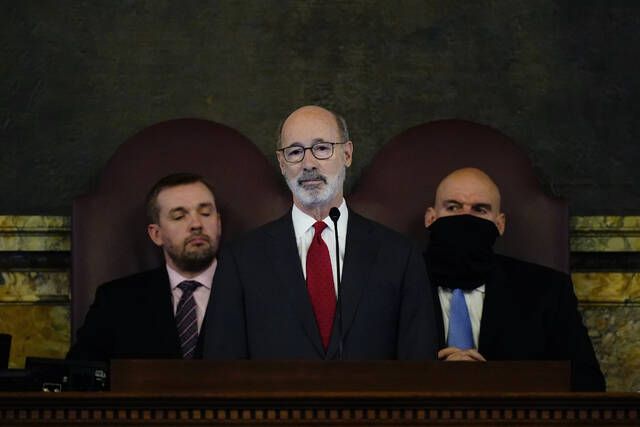
Democratic Gov. Tom Wolf delivers his budget address for the 2022-23 fiscal year to a joint session of the Pennsylvania House and Senate in Harrisburg, Pa., Tuesday, Feb. 8, 2022. (AP Photo/Matt Rourke)
Click here to subscribe today or Login.
Gov. Tom Wolf’s proposed budget has all the earmarks of a lame duck swinging for the fences, and Republican lawmakers are correct in criticizing the proposed huge increase in state spending without putting a mechanism in place to assure future revenue to sustain the spending annually.
State Sen. Lisa Baker, R-Lehman Township, was quite possibly close to the truth when she said, according to a story by staff writer Bill O’Boyle, that the budget appears to rely too heavily on federal COVID-19 relief money for what could become recurring costs.
“We don’t need to spend every penny we have on hand, as the governor wants to do, knowing that it simply won’t be there down the road,” Baker said.
Yet we believe critics in the legislature do a serious discredit to their constituents and the state by dismissing the proposal out of hand, as State Senate Pro Tempore Jake Corman — a candidate for the Republican nomination for governor — did when he quipped “The governor proposes and the legislature disposes.”
Glib, but not helpful.
Corman also said he is “old enough to remember” the TV show “Fantasy Island” (referring, presumably to the original, and not the 2020 reboot) and declared that “in a lot of ways Harrisburg has become Fantasy island with this proposal.”
Maybe. But we humbly suggest it’s also a fantasy to believe the state couldn’t use much of what Wolf proposes.
For seven years (this is his last as governor, as per a constitutional limit) Wolf has talked about investing in things that make the state’s future brighter. His “Priorities for Pennsylvania” motto sums it up: “Schools that teach. Jobs that pay. Government that works.”
Wolf’s budget invests heavily in public education, provides more money to the Pennsylvania State System of Higher Education, reduces the corporate net income tax, funds two new child care options for state employees, sets aside money to help manufacturers adapt to changing times and tech so they can remain competitive, includes more money for job training and pumps more money into law enforcement as well as community-led gun violence prevention efforts — among other things.
None of these, we think, sound like fantasies. They seem, like solid ideas most, if not all legislators could embrace if resources allow.
Which, of course, is the sticking point. Wolf has taken to claiming his administration “turned a $2-3 billion structural budget deficit into a $2-3 billion budget surplus” while dramatically increasing the state’s “rainy day” fund. He conveniently omits crediting the federal pandemic relief bonanza for at least some — if not most — of that success.
Still, his priorities remain sound choices for long-term state success. They might even help keep local taxes down. As noted in a separate story Wednesday, the governor’s proposed budget would increase state money to Luzerne County’s 11 school districts by more than 30%. One would hope that, with such a transformational change to state support, local property taxes would drop and/or academic outcomes would improve substantially over coming years.
It seems it would be more helpful if Republicans tried to avoid their knee-jerk response to increased spending and took the budget as a template both sides can use to work toward a different, and better, future for all Pennsylvanians.
— Times Leader




